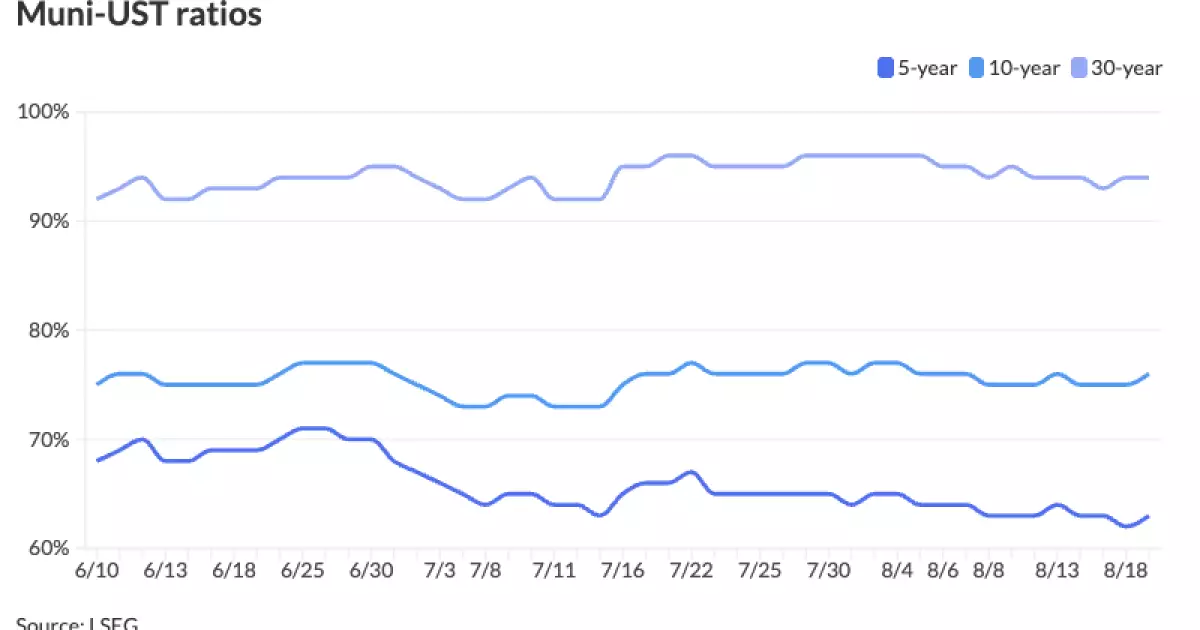The municipal bond landscape, often perceived as a bastion of stability within the broader financial ecosystem, is revealing unsettling signs of fragility. Recent movements suggest that the market’s resilience is more superficial than substantive, driven largely by external support from the Treasury market rather than inherent strength. The slight fluctuations in yields, coupled with narrowing spreads, may give an illusion of calm; however, beneath this veneer lies an undercurrent of vulnerability that savvy investors should not ignore. As Treasury yields dip marginally, municipal bonds have maintained their positions—yet this apparent steadiness is precarious at best, hinging on macroeconomic whims and fleeting policy signals. This delicate equilibrium is susceptible to disruptions, from geopolitical shocks to inflation surprises, making the current stability more of a fragile truce than an enduring fortification.
Supply and Demand: Unsustainable Currents Beneath the Surface
Despite the ominous warnings from some analysts, the municipal market still boasts a substantial pipeline of issuance—around $6.2 billion slated for the upcoming week. This elevated level of supply might seem promising on the surface, but it masks an underlying tension. The robust year-to-date issuance, exceeding $366 billion, hints at a market that is exerting considerable pressure on liquidity and demand. While institutional and managed-account inflows have temporarily cushioned these pressures, retail demand remains fragile, especially amidst recent inflation data that has sowed seeds of uncertainty. The market’s reliance on reinvestment flows—estimated at around $55 billion for August—could prove to be a double-edged sword. As these flows diminish, and issuance slows down, the market may discover that its buoyancy was artificially propped up, making it vulnerable to even minor shocks.
Risk Premiums: The Widening Credit Spreads and What They Signal
One cannot ignore the significant steepening of the yield curve—a telltale sign of investors demanding higher risk premiums for longer maturities. Although widening credit spreads have not yet resulted in broad-based deterioration among prime credits, the increase indicates an underlying apprehension about future defaults and credit risk escalation. The recent ‘cheap and steep’ curve paradoxically offers an opportunity for opportunistic buying, but it also signals increased caution among sophisticated players. This scenario suggests that while current fundamentals appear stable, the market is pricing in a future where risks—driven by high issuance volumes, potential sector impairments (like the Brightline situation), and external shocks—could materialize at any moment. The gradual increase in spreads acts as an early warning, reminding seasoned investors that complacency is a strategic risk in this environment.
Policy, Inflation, and Market Direction: A Toxic Cocktail
Federal policy signals loom large over municipal bonds, especially with the upcoming release of FOMC minutes and inflation data. The prospect of fewer-than-expected rate cuts in 2025 has the potential to weaken front-end demand, pushing yields higher and causing a ripple effect across maturities. This environment, characterized by a persistently high-rate backdrop, undermines the appeal of long-term munis and accentuates the importance of shorter-term strategies. The bond market is increasingly shaped by macroeconomic and political uncertainties, turning it into a battlefield where fiscal discipline, inflation management, and monetary policy are intertwined with investor sentiment. The apprehension surrounding potential policy shifts underscores that the current apparent stability is fragile—subject to rapid change if political or macroeconomic winds blow stronger.
The Political Dimension: Market Prices as a Reflection of Confidence, Not Certainty
In a political climate marked by heightened polarization and fiscal debates, municipal bonds serve as a barometer of public confidence in government stability and policy direction. The ongoing issuance of taxable and tax-exempt bonds, including sizable deals in Texas, Maine, and Wisconsin, illustrates a pragmatic push by jurisdictions to fund infrastructure and public services amid uncertain fiscal futures. Yet, just beneath the surface, there is growing suspicion that these issuance levels are unsustainable long-term—especially if economic growth falters or political gridlock intensifies. Investors are increasingly aware that municipal bonds, often touted as safe havens, are not immune to political risks, especially when they depend on prolonged fiscal prudence and stable taxation. The volatility in sectors like high-yield and insured bonds further highlights that the political and fiscal environment’s stability is more fragile than many wish to believe, potentially unraveling optimism supported by current demand flows.
The municipal bond market, long considered a safe harbor for conservative investors, is now teetering on the edge of structural vulnerability. While superficial indicators such as declining yields, strong issuance, and steady demand suggest resilience, a closer look reveals a landscape fraught with hidden risks. Elevated supply, widening risk premiums, macroeconomic uncertainties, and political instability combine to create a precarious footing. If policymakers hesitate or inflation accelerates unexpectedly, the veneer of stability could fracture swiftly, exposing the market to sharp corrections. Savvy investors with a nuanced understanding of these dynamics should exercise caution, recognizing that today’s apparent calm may indeed be a fleeting respite before the storm.

